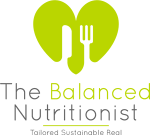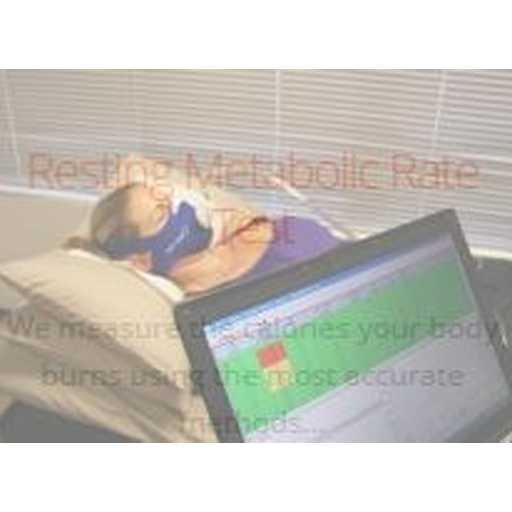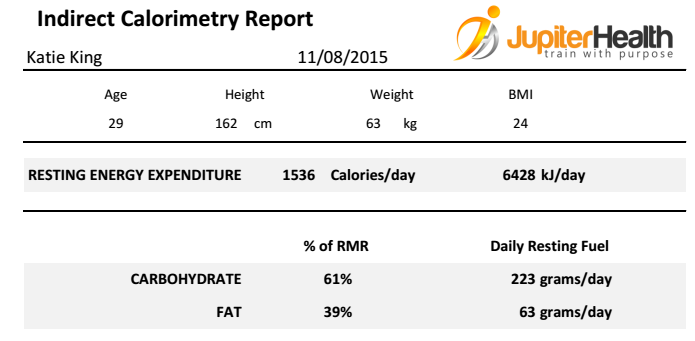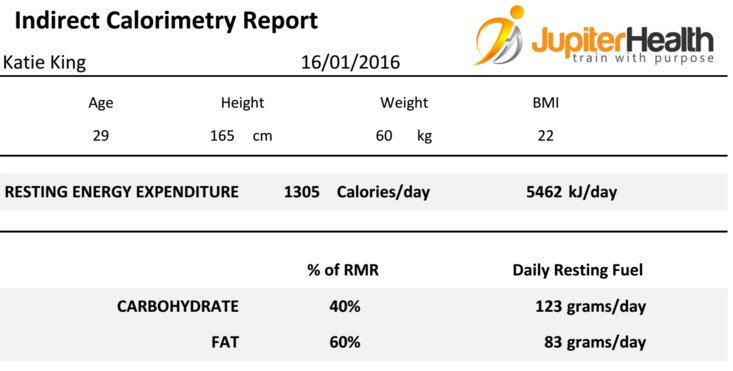I know I bang on about metabolism testing with the team at JupiterHealth, but here are three reasons why I love it:
- It’s a test that gives us access to heaps of data that relates to your metabolism and your fitness and training ability*. When interpreted by professionals who understand every aspect of it, you can use the data in so many ways to improve your body composition, your performance and fitness, but above all else your health overall.
(*Note: downloading an internet program and entering your height, age and desired weight loss is a generic approach which may offer results for some but not many. Trust me, I’ve seen about 30 different test results now and we are ALL completely unique.)
- It looks at overall fat burning both at rest and during exercise. Calorie expenditure is one thing, but high fat burning ability is an indication of overall health. It generally means inflammation is lower, cellular respiration is better, mitochondrial efficiency is higher and overall energy levels will be far greater.
- Because the team at JupiterHealth are quite frankly awesome. They offer great service, their equipment is state of the art and Mark and Therese are true pioneers in the sphere of metabolism testing. Their approach is holistic and offers sustainable, long term results not overnight fixes. Mark is constantly updating the exercise programs based on new research; he’s pretty much a walking encyclopaedia of the latest exercise physiology research papers.
Oh and a fourth reason, the reason for this blog, is that I have benefited greatly from having my own metabolic testing done. It’s helped me improve my running, train more efficiently and effectively and most definitely resolve some fatigue issues I have battled since 2013*. (A story for another time: motto of the story, don’t expect to strip back to 10% body fat for competition body sculpting and not pay a large price).
So, I am now able to compare data after retesting my resting metabolism today at the centre. Here are the results from October last year:
And here are the results from today’s test, 15 weeks later:
What’s changed and why is it significant?
The most significant change is my metabolism switching from a 60% carbohydrate engine to a 60% fat burning engine (at rest). My RQ,* a measurement which is increasingly being recognised as an important health marker, has dropped from 0.88 to 0.81. A higher RQ (closer to 1.0) indicates sluggish cellular respiration,* high inflammation and oxidative stress. It may also suggest other more serious underlying conditions including insulin resistance but that isn’t relevant in my case. It may manifest differently person to person but 2 common symptoms include fatigue and difficulty shifting body fat. In fact, JupiterHealth have done extensive work with clients suffering from chronic fatigue and often see carbohydrate burning as high as 90% in these cases. (*RQ: a measurement of the relevant amounts of macronutrients utilised by an individual based on carbon dioxide produced divided by oxygen consumed).
This is a significant change because it has greatly improved my wellbeing in the last 3 months. My energy levels have been far better than they were 3 months ago as has my mental health (read more here). My heart rate during exercise has come down a lot which will show up even more when I redo my exercise test. This in turn has benefitted my recovery and made training far more enjoyable and less stressful on my body. I have actually reduced my training load by 30% in the last couple of months but I am getting much more out of each session. Finally, an added bonus is weight loss of (now) more than 4kg. 59-60kg is basically ideal for me so I’ll be keeping it there.
Besides the HR training program issued to me by JupiterHealth (available to any of my clients who have their testing done) I have changed my nutrition a little by fuelling my high intensity sessions better and focusing on some key nutrients I think I was lacking including iodine.* I have also been taking Lipoic Acid*, CoEnzymeQ10*, 600mg of magnesium* with GABA*, a probiotic* and vitamin C* daily. It may sound like a lot, but there were other factors that I needed to address and this was my personal prescription. Please do not take this as individual supplement advice – consult a qualified Nutritionist or Naturopath and purchase evidence based supplementation, preferably from ‘practitioner only’ ranges (available only on script from a health practitioner – avoid nasty additives and supplements that contain trace nutrients only).
Oh, I can’t leave this blog without mentioning the fact that my resting energy expenditure has decreased from 1536 to 1305 calories per day. Although I am more about nutrients then calories this is still important because it indicates my metabolism has slowed down a little since last testing. My overall mass has decreased so naturally, my body needs less fuel, BUT this decrease of more than 200 calories per day still represents something I need to work on. I am fairly certain it reflects a loss of muscle mass, having only recommenced weight training in the last 10 days after a 6 week break. On Monday, I plan to scan my muscle and fat ratio in clinic and work on building up my muscle mass again to increase this resting energy expenditure.
I have a number of clients getting retested with JupiterHealth in coming weeks and I am looking forward to seeing their changes. This represents just a tip of the iceberg as far as the metabolic testing, but I hope it’s been of some interest to you.
Iodine: required for healthy levels of T3 and T4 thyroid hormones, making up more than 50% of these hormones
Lipoic Acid: powerful antioxidant and cofactor in healthy mitochondrial activity which has been shown in research studies to assist with both fatty acid and glucose metabolism. Specifically very effective in the treatment of Diabetes, often helping to reduce blood sugar levels and overall HbA1c.
CoQ10: Critical nutrient involved in energy production at the mitochondrial level, facilitating electron transport in the production of ATP. A key nutrient for endurance athletes in dosages of 150mg, preferably a mix of the active and inactive form. Recommended for people on statin drugs as statins appear to reduce the availability of CoQ10 in the body and may contribute to myopathy.
Magnesium: the majority benefit from supplemental magnesium as its lacking in modern farming practises due to depleted soil levels. Relaxant of muscles, blood vessels, nerve conduction and many other processes. Indicated for high blood pressure, stress, muscle pain, muscle cramps, headaches, period pain, etc. Correct form is critical; magnesium glycinate, citrate and chelate show high absorbency. Best to avoid magnesium carbonate as may not be highly absorbable.
GABA: gamma-aminobutric acid. The chief of the inhibitory neurotransmitters, which I appear to be highly deficient in. Excellent for anxiety, stress, ‘calming the chatter,’ night terrors and various mental health issues. Should be practitioner prescribed and compounded carefully with supporting nutrients.
Probiotic: Various strains available (many – so again, get the right one from a professional otherwise you are wasting your money) for gut health.
Vitamin C: for adrenal support and immunity, as well as antioxidant status.



